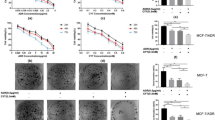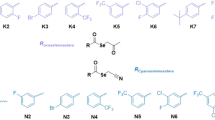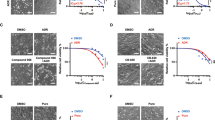Abstract
Shenmai injection (SMI) is a Chinese patent-protected injection, which was mainly made of Red Ginseng and Radix Ophiopogonis and widely used for treating coronary heart disease and tumors by boosting Qi and nourishing Yin. In this study we examined whether SMI could produce direct synergetic effects on the cytoxicity of adriamycin (ADR) and paclitaxel (PTX) in colorectal cancers in vivo and in vitro, and explored the underlying pharmacokinetic mechanisms. BALB/c nude mice with LoVo colon cancer xenografts were intraperitoneally injected with ADR (2 mg·kg−1·3d−1) or PTX (7.5 mg·kg−1·3d−1) with or without SMI (0.01 mL·g−1·d−1) for 13 d. Co-administration of SMI significantly enhanced the chemotherapeutic efficacy of ADR and PTX, whereas administration of SMI alone at the given dosage did not produce visible anti-cancer effects, The chemosensitizing action of SMI was associated with increased concentrations of ADR and PTX in the plasma and tumors. In Caco-2 and LoVo cells in vitro, co-treatment with SMI (2 μL/mL) significantly enhanced the cytotoxicity of ADR and PTX, and resulted in some favorable pharmacokinetic changes in the subcellular distribution of ADR and PTX. In addition, SMI-induced intracellular accumulation of ADR was closely correlated with the increased expression levels of P-glycoprotein in 4 colon cancer cell lines (r2=+0.8558). SMI enhances the anti-cancer effects of ADR and PTX in colon cancers in vivo and in vitro by improving the subcellular distributions of ADR and PTX.
Similar content being viewed by others
Log in or create a free account to read this content
Gain free access to this article, as well as selected content from this journal and more on nature.com
or
References
Liss AL, Abu-Isa EI, Jawad MS, Feng FY, Vance SM, Winfield RJ, et al. Combination therapy improves prostate cancer survival for patients with potentially lethal prostate cancer: the impact of Gleason pattern 5. Brachytherapy 2015; 14: 502–10.
Qi F, Zhao L, Zhou A, Zhang B, Li A, Wang Z, et al. The advantages of using traditional Chinese medicine as an adjunctive therapy in the whole course of cancer treatment instead of only terminal stage of cancer. Biosci Trends 2015; 9: 16–34.
Li J, Zhang F . The immunoregulatory effects of traditional Chinese medicine on treatment of asthma or asthmatic inflammation. Am J Chin Med 2015; 1–23.
Lu LY, Zheng GQ, Wang Y . An overview of systematic reviews of shenmai injection for healthcare. Evid Based Complement Alternat Med 2014; 2014: 840650.
Zhu WR, Zheng L, Guo YB, Yuan JM, Shen XH . Clinical research of intraperitoneal chemotherapy plus Shenmai Injection in treating advanced colorectal cancer. Zhong Xi Yi Jie He Xue Bao 2005; 3: 266–9.
Chen YZ, Li ZD, Gao F, Zhang Y, Sun H, Li PP . Effects of combined Chinese drugs and chemotherapy in treating advanced non-small cell lung cancer. Chin J Integr Med 2009; 15: 415–9.
Chen Z, Wang P, Huang WX, Liu LM . Experimental study on effects of shengmai injection: enhancing 5-FU anti-tumor efficacy and reducing its toxicity. Zhong Xi Yi Jie He Xue Bao 2005; 3: 476–9.
Wang L, Huang XE, Cao J . Clinical study on safety of cantharidin sodium and shenmai injection combined with chemotherapy in treating patients with breast cancer postoperatively. Asian Pac J Cancer Prev 2014; 15: 5597–600.
Dong QT, Zhang XD, Yu Z . Integrated Chinese and Western medical treatment on postoperative fatigue syndrome in patients with gastric cancer. Zhongguo Zhong Xi Yi Jie He Za Zhi 2010; 30: 1036–40.
Xia CH, Sun JG, Wang GJ, Shang LL, Zhang XX, Zhang R, et al. Herb-drug interactions: in vivo and in vitro effect of Shenmai injection, a herbal preparation, on the metabolic activities of hepatic cytochrome P450 3A1/2, 2C6, 1A2, and 2E1 in rats. Planta Med 2010; 76: 245–50.
Xia C, Sun J, Wang G, Shang L, Zhang X, Zhang R, et al. Differential effect of Shenmai injection, a herbal preparation, on the cytochrome P450 3A-mediated 1′-hydroxylation and 4-hydroxylation of midazolam. Chem Biol Interact 2009; 180: 440–8.
Zeng C, He F, Xia C, Zhang H, Xiong Y . Identification of the active components in Shenmai injection that differentially affect Cyp3a4-mediated 1′-hydroxylation and 4-hydroxylation of midazolam. Drug Metab Dispos 2013; 41: 785–90.
Zhang J, Zhou F, Wu X, Gu Y, Ai H, Zheng Y, et al. 20(S)-ginsenoside Rh2 noncompetitively inhibits P-glycoprotein in vitro and in vivo: a case for herb-drug interactions. Drug Metab Dispos 2010; 38: 2179–87.
Lu M, Zhou F, Hao K, Liu J, Chen Q, Ni P, et al. Alternation of adriamycin penetration kinetics in MCF-7 cells from 2D to 3D culture based on P-gp expression through the Chk2/p53/NF-kappaB pathway. Biochem Pharmacol 2015; 93: 210–20.
Zhang J, Zhou F, Wu X, Zhang X, Chen Y, Zha BS, et al. Cellular pharmacokinetic mechanisms of adriamycin resistance and its modulation by 20(S)-ginsenoside Rh2 in MCF-7/Adr cells. Br J Pharmacol 2012; 165: 120–34.
Lo LC, Chen CY, Chen ST, Chen HC, Lee TC, Chang CS . Therapeutic efficacy of traditional Chinese medicine, Shen-Mai San, in cancer patients undergoing chemotherapy or radiotherapy: study protocol for a randomized, double-blind, placebo-controlled trial. Trials 2012; 13: 232.
Siegel R, Desantis C, Jemal A . Colorectal cancer statistics. 2014. CA Cancer J Clin 2014; 64: 104–17.
Yu J, Xin YF, Gu LQ, Gao HY, Xia LJ, You ZQ, et al. One-month toxicokinetic study of SHENMAI injection in rats. J Ethnopharmacol 2014; 154: 391–9.
Gao JL, Lv GY, He BC, Zhang BQ, Zhang H, Wang N, et al. Ginseng saponin metabolite 20(S)-protopanaxadiol inhibits tumor growth by targeting multiple cancer signaling pathways. Oncol Rep 2013; 30: 292–8.
Zhang F, Li M, Wu X, Hu Y, Cao Y, Wang X, et al. 20(S)-ginsenoside Rg3 promotes senescence and apoptosis in gallbladder cancer cells via the p53 pathway. Drug Des Devel Ther 2015; 9: 3969–87.
Zhang H, Gong J, Kong D . Induction of apoptosis and reversal of permeability glycoprotein-mediated multidrug resistance of MCF-7/ADM by ginsenoside Rh2. Int J Clin Exp Pathol 2015; 8: 4444–56.
Paolini A, Baldassarre A, Del Gaudio I, Masotti A . Structural features of the ATP-binding cassette (ABC) transporter ABCA3. Int J Mol Sci 2015; 16: 19631–44.
Li X, Hu J, Wang B, Sheng L, Liu Z, Yang S, et al. Inhibitory effects of herbal constituents on P-glycoprotein in vitro and in vivo: herb-drug interactions mediated via P-gp. Toxicol Appl Pharmacol 2014; 275: 163–75.
Li N, Wang D, Ge G, Wang X, Liu Y, Yang L . Ginsenoside metabolites inhibit P-glycoprotein in vitro and in situ using three absorption models. Planta Med 2014; 80: 290–6.
Bhirde AA, Kapoor A, Liu G, Iglesias-Bartolome R, Jin A, Zhang G, et al. Nuclear mapping of nanodrug delivery systems in dynamic cellular environments. ACS Nano 2012; 6: 4966–72.
Zhou F, Zhang J, Li P, Niu F, Wu X, Wang G, et al. Toward a new age of cellular pharmacokinetics in drug discovery. Drug Metab Rev 2011; 43: 335–45.
Acknowledgements
The work is supported by the National Natural Science Foundation of China (No 81573496, 81530098, 81573494); Jiangsu Province Key Laboratory of Drug Metabolism and Pharmacokinetics Projects (No BM2012012); Natural Science Foundation of Jiangsu Province (No BK20131308, BK20160076); Open Research Fund of State Key Laboratory of Bioelectronics, Southeast University; China “Creation of New Drugs” Key Technology Projects (No 2015ZX09501001); and Foundation for Innovative Research Groups of the National Natural Science Foundation of China (No 81421005).
Author information
Authors and Affiliations
Corresponding authors
Additional information
Supplementary information is available on the Acta Pharmacologica Sinica's web site.
Supplementary information
Supplementary Figure S1
Effects of SMI combination treatment on the pathological histology of heart, liver and kidney by HE staining (×200) in LoVo colon cancer xenograft mice. (DOC 1475 kb)
Supplementary Figure S2
P-gp mRNA level in four colon cancer cell lines and the correlation between SMI-induced changes in intracellular ADR accumulation and P-gp gene expression. (DOC 71 kb)
Supplementary Figure S3
Typical fingerprint of Shenmai Injection with 16 characteristic peaks detected by HPLC method. (DOC 35 kb)
Rights and permissions
About this article
Cite this article
Liu, Wy., Zhang, Jw., Yao, Xq. et al. Shenmai injection enhances the cytotoxicity of chemotherapeutic drugs against colorectal cancers via improving their subcellular distribution. Acta Pharmacol Sin 38, 264–276 (2017). https://doi.org/10.1038/aps.2016.99
Received:
Accepted:
Published:
Issue date:
DOI: https://doi.org/10.1038/aps.2016.99
Keywords
This article is cited by
-
Shenmai Injection Reduces Cardiomyocyte Apoptosis Induced by Doxorubicin through miR-30a/Bcl-2
Chinese Journal of Integrative Medicine (2025)
-
MM-HiFuse: multi-modal multi-task hierarchical feature fusion for esophagus cancer staging and differentiation classification
Complex & Intelligent Systems (2025)
-
The therapeutic effects of traditional chinese medicine on COVID-19: a narrative review
International Journal of Clinical Pharmacy (2021)
-
Usage of Chinese Herbs in Cancer Patients in Southern China: A Survey
Chinese Journal of Integrative Medicine (2021)
-
Protective effect of Shenmai injection on doxorubicin-induced cardiotoxicity via regulation of inflammatory mediators
BMC Complementary and Alternative Medicine (2019)



